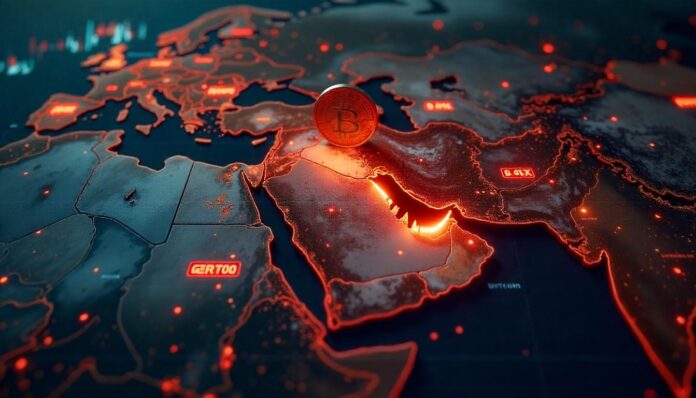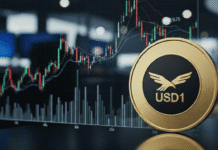
Crypto markets at critical juncture following Middle East tensions; volatility and Bitcoin's recovery point to a promising future.
A sudden spike in short-term implied volatility has rocked cryptocurrency traders, triggering a wave of speculation and anxiety. According to data provided by Derive.xyz, one-week implied volatility reached 45% for Bitcoin and a staggering 83% for Ethereum, figures that reflect growing investor concern as risks stemming from recent geopolitical tensions in the Middle East are factored in. Although these indicators fell slightly toward the close, the firm noted that turbulence still lies ahead, anticipating that the market has not yet fully adjusted its expectations and positions in the face of this uncertainty.
This increase in volatility is no coincidence. In an environment where political and military uncertainty affects global confidence, digital assets show acute sensitivity to changes in risk perception, even more so when critical factors such as the threat of closure of the strategic Strait of Hormuz intervene.
BUY ETHEREUM HEREThe Strait of Hormuz: A Decisive Factor in Crypto Market Confidence
The Strait of Hormuz, a vital shipping lane for global energy trade, has become a key factor influencing investor sentiment. Iran's threat to close this route has generated alarm, undermining confidence in financial markets, including cryptocurrency markets. This situation has triggered a chain reaction, generating uncertainty and volatility in a market that, although young and dynamic, has begun to show signs of maturity and resilience.
However, specialists in QCP Capital They offer a more nuanced analysis, noting that options traders don't appear to be betting on an imminent blockage of the Strait. This suggests that, despite the tension, there is a calmer interpretation among market players, who are cautiously assessing the probabilities and consequences.
Nic Puckrin, founder of Coin Bureau, brings a pragmatic perspective to this complex scenario. He defined the possibility of a blockade as "economic suicide" for Tehran, emphasizing that such a measure would deeply damage the Iranian economy and negatively impact its internal stability. This assessment, coupled with the observation that traders "read between the lines," largely explains Bitcoin's overnight rebound following the threats, a clear example of how quickly the market can correct its course when it perceives contradictory signals.
This analysis offers a clear example of how geopolitics and the global economy intertwine to influence digital assets, which, despite their decentralized nature, are not immune to global events. In fact, the dynamics of the crypto market reflect in real time the hopes, fears, and investment strategies emerging in every corner of the planet.
BUY BITCOIN HEREVolatility and resilience: the duality of the crypto market in the face of geopolitical conflicts
The recent rise in implied volatility for Bitcoin and Ethereum clearly illustrates this duality. On the one hand, volatility is a sign of risk and uncertainty, a reflection of global tension. On the other, it represents an opportunity for those who understand market movements and signals to capitalize on a changing environment.
To understand this volatility, let's think of the cryptocurrency market as a calm ocean that is disturbed by external storms. When geopolitical conflicts like the current one occur, the waves become unpredictable, and experienced sailors adjust their sails to take advantage of the situation. New traders, on the other hand, may feel lost or frightened by the magnitude of the movement.
For example, the expectation that Iran may close the Strait of Hormuz not only directly affects confidence in cryptocurrencies but also has indirect repercussions by impacting oil prices and global economic stability. This situation causes investors to seek safe haven assets, which has historically benefited metals like gold and now, to some extent, digital currencies like Bitcoin.
However, the market's reaction to events like this also demonstrates a growing decoupling from traditional assets. The speed with which Bitcoin recovered after the initial plunge following the negative news reflects a budding confidence in its role as a store of value, although this confidence is still developing and vulnerable to the vagaries of international politics.
EXPLORE THE POTENTIAL OF YOUR CRYPTOSThe importance of understanding the macroeconomic and geopolitical context
In any case, the situation in the Middle East is not an isolated case but part of a broader framework that includes factors such as global inflation, the monetary policies of major powers, and technological evolution within the blockchain ecosystem. All of these aspects come together to define the health and future of cryptocurrencies.
For example, the recent introduction of spot Bitcoin ETFs has brought a new layer of legitimacy and maturity to the market, facilitating the entry of institutional capital. At a time of heightened volatility due to geopolitical tensions, the presence of institutional investors can help stabilize prices over the long term, balancing the volatility of retail traders and speculators.

Cryptocurrency Technical Analysis Course
Medium levelIn this training we have Iván González, a professional expert in investments and cryptocurrencies, to teach you how the market works and how prices affect the behavior of investors.
Conclusions: What can we expect from the crypto markets after this turning point?
Thus, Bitcoin's plunge driven by the Middle East tensions has tested the resilience of the crypto market, making it clear that significant challenges remain. However, the rapid recovery and signs that traders are ruling out catastrophic scenarios like the blockage of the Strait of Hormuz point to a market learning to manage uncertainty with greater sophistication.
This turning point could mark the beginning of a new era where volatility, far from being just a risk, becomes an opportunity to consolidate the adoption and maturity of cryptocurrencies. The role of key players, such as research firms, institutional investors, and technology developers, will be critical in guiding the market through this transition, balancing speculation with solid fundamentals.
Finally, understanding how geopolitics influences the crypto ecosystem is essential for any investor or enthusiast. Recent history shows that global events can trigger significant movements, and knowing how to interpret these signals offers a crucial competitive advantage in navigating the dynamic world of cryptocurrencies.


